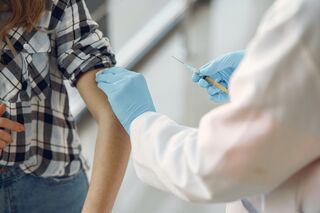Coronavirus Disease 2019
Dr. Drew Pinsky Shares Thoughts on Vaccine Hesitancy
An interview with the celebrity addiction specialist about the COVID-19 vaccine.
Posted April 24, 2021 Reviewed by Jessica Schrader

I recently had the opportunity to chat with celebrity addiction specialist Dr. Drew Pinsky. We discussed why we think some people are hesitant to get the coronavirus vaccine.
What do you think are the public's main concerns regarding getting the vaccine?
I think there are several different categories of it. I think there are people who are committed to not getting vaccines, whose worldview depends on vaccines being bad. But, that's not the predominant group out there. The predominant group out there probably breaks down into several groups. One that believes it's experimental or it's for emergency use, or it came on too quickly—something about the procedure with which the vaccine came. ... Two, the group that doesn't trust the medical system period, and they have reason for that—they have been mishandled at some time in the past. Then, there is finally a group that thinks, "Why should I take an experimental vaccine for a condition that I have a 1 percent fatality rate with?"
How much time do you think the vaccine needs to be circulating in order for people to become desensitized to these concerns?
I think that probably breaks down into different groups as well. There is the hesitancy group, that I was probably in very early on. I wanted to see how it rolled out. There is a group that came on board, that are reassured now. There is a group that wants to see long-term—I don't know what long-term means to them, I'm imagining a year or two. And there is a group that will never be convinced.
Do you think the addictions community has its own concerns regarding the vaccine?
Not that I've seen, though they break down into different camps too. Someone who is using is only interested in using, if you came in and said you could keep using if you got your vaccine, they would be in. But, recovering groups can get into cliques and things, they can have funny ideas.
What would you say to the people who want to get one shot, but not the second shot?
What I normally say is, it's going to be intense, the second shot, but you are already in. You want to get the full benefit of what you are doing. Also, it just doesn't make sense, it's not like there is some added risk you're getting into with the second shot. So, I don't know, I would just ask them what their fears were. Getting only one shot (for two-dose vaccines) just doesn't make full sense—you're only getting part of the benefit and whatever risk you imagine, you have already accumulated that with one vaccine, and, as you see, you do quite well with it.
Note
I am very appreciative of Dr. Drew's time and thoughts related to this matter. I would like for the readers to know that it is natural and understandable to feel fear or discomfort when thinking about getting this vaccine. If you would like to get the vaccine, yet are hesitating because the vaccine is new, I would recommend that you slowly desensitize yourself. You can do this, for example, by beginning to visualize getting the shot. Next, you can drive to the location where you would get the shot, but not go inside. Then, you can drive to the location of the shot and go inside. For those who have concerns about whether or not to get the shot, I also strongly recommend discussing the issue with your licensed medical practitioner.


